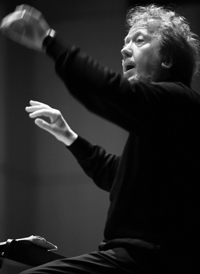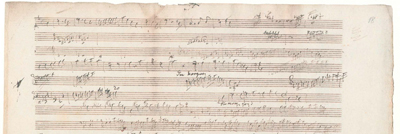By Daniel Hautzinger

On July 19 at 7:00 at Severance Hall, Nelson will lead the Credo Festival Orchestra and Chorus in a performance of Haydn’s late oratorio The Creation, which was inspired by Haydn’s visits to England where he heard Handel’s oratorios.
Nelson believes that his performances reflect his extensive life experiences: “You wish when you were younger you had the wisdom of old age,” he said in a phone conversation. “[Musical] notes are full of life’s experiences. If we try to separate that, I think we’re missing the whole idea of music.”
Nelson thinks The Creation is a good example. “I don’t think Haydn could have written this earlier in his life. He was coming to the end, was in his last years, but there was still this amazing joy. The closer we get to death, the more we have to give, the more life experience to share.”
That’s true for performing the music as well as writing it. Nelson himself first conducted The Creation “many, many years ago, probably forty years ago,” he said. “I think I’ve done it fifteen different places. And it has progressed and it’s grown, as it should. Pieces of music are endless, they’re bottomless pits. You never get to a full understanding of them.”
The Creation is equally vast in its scope as well, illustrating the chaos before existence, the creation of the world and its inhabitants, and the first few hours of Adam and Eve in the Garden of Eden. To musicalize such expansive material, it calls for three soloists (Lisette Orapesa, soprano, John Tessier, tenor, and Adam Lau, bass at Severance), chorus, and orchestra. In addition to Credo students, on the 19th the orchestra will include musicians from the Cleveland and Philadelphia Orchestras and Dallas and Pittsburgh Symphonies.
The libretto is a mixture of the biblical Books of Genesis and Psalms, as well as Milton’s Paradise Lost. “Haydn was obviously very moved by the text. There are reports of his getting down on his knees and praying every day for inspiration as he wrote the piece,” Nelson explained. “Orchestral musicians, by-and-large, do not deal with text. So how do I convey the meaning to the orchestra? At my age, I need my musicians to understand what the music is all about. I’ve found in the last several years I have a strong desire to get to the bottom of things, to get to the depths of a piece.”
Nelson is excited to work with the students of the Credo Festival Orchestra. “They will listen and take it in,” he said. “It’s one of the privileges of my life now to be a kind of mentor and work a lot with orchestras of this kind, to set their sights higher than just notes.”
Though The Creation is a sacred work, the responses for both performers and audience don’t necessarily have to be religious, especially in a secular age. “In the depths of everyone there is a desire to connect with ‘the spiritual,’ whatever that means for different people. Since the Church is not addressing it in the way that our society is receiving it, music functions that way.
“Take France as an example,” Nelson said. “It’s as secular a country as there is on this earth. And yet the number of concerts that are done in churches, and the audience that comes to these concerts of sacred music, is enormous.”
Nelson realizes that music is religion for some people. “I happen to be a believer, so I would prefer that people get to the root of it all. But in the process of getting to the root of it, there’s some pretty nice stuff growing on the ground that is good for the soul, good for the spirit. And music is providing that. I’m thrilled that that is the case.”
Published on ClevelandClassical.com July 12, 2014.
Click here for a printable copy of this article.




